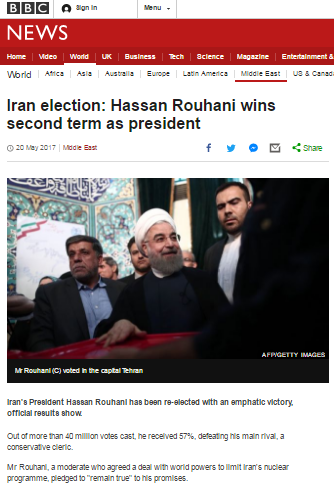The July 12th edition of the BBC World Service radio programme ‘Newshour’ included an item (from 14:08 here) about the tenth anniversary of the Second Lebanon War which was introduced by presenter Razia Iqbal as follows:
“Let’s head to the Middle East now. In a region devastated by wars in Syria and Iraq which have changed things utterly, the enmity between Israel and Hizballah appears to be the one thing that hasn’t shifted. Ten years ago today the two sides fought a 33 day war that cost thousands of lives. The BBC’s Rami Ruhayem reports now from Lebanon, asking what’s changed in the decade since the conflict.”
One answer to the question of what has changed in the last ten years is that Hizballah now possesses an Iranian supplied missile arsenal which is far bigger than the one it had in July 2006 and which threatens many more Israeli civilians. Another answer is that the UN Security Council resolution of August 2006 (1701) which was supposed to prevent (under UNIFIL supervision) Hizballah’s rearmament, its positioning of missiles in southern Lebanon, the resulting use of the population of that region as human shields and to bring an end to Hizballah’s presence south of the Litani river, has shown itself to have resoundingly failed.
” – security arrangements to prevent the resumption of hostilities, including the establishment between the Blue Line and the Litani river of an area free of any armed personnel, assets and weapons other than those of the Government of Lebanon and of UNIFIL as authorized in paragraph 11, deployed in this area;
– full implementation of the relevant provisions of the Taif Accords, and of resolutions 1559 (2004) and 1680 (2006), that require the disarmament of all armed groups in Lebanon, so that, pursuant to the Lebanese cabinet decision of 27 July 2006, there will be no weapons or authority in Lebanon other than that of the Lebanese State;
– no foreign forces in Lebanon without the consent of its Government; – no sales or supply of arms and related materiel to Lebanon except as authorized by its Government;”
Despite the fact that Rami Ruhayem began his report with an interview with a UNIFIL spokesman, he did not inform BBC audiences of any of the above issues.
“Spanish troops patrol Lebanon’s southern border. They are part of a multinational force that’s been around for decades. It was expanded after the 2006 war.”
Listeners even heard the UNIFIL spokesman make the following claim without any challenge or qualification from Ruhayem:
“The presence of over ten thousand troops coming from 40 different countries; it’s very important for the stability of the south of Lebanon…”
Ruhayem went on to give a partial description of the events which brought about the Second Lebanon war, erasing the Hizballah missile fire on Israeli civilian communities which was carried out at the same time as its infiltration into Israeli sovereign territory.
“But this UN force is not what’s prevented a new war from breaking out. In 2006 after Hizballah killed eight Israeli soldiers and abducted two in a cross-border raid, Israel launched an all-out war on Lebanon and tried – but failed – to destroy Hizballah’s missile arsenal.”
He continued with an inaccurate description of Lebanese casualties.
“Forty-four civilians and 121 soldiers were killed, leaving Israel’s leadership in disarray. Lebanon paid a much heavier price. More than a thousand civilians were killed, about a million displaced, in addition to the lingering misery of cluster bombs dropped by Israel that are still claiming victims.”
The inaccurate claim that the war’s 1,191 Lebanese casualties were all civilians clearly misleads audiences. Lebanese figures do not differentiate between civilians and combatants but Lebanese officials reported even before the conflict was over that some 500 of the dead were Hizballah combatants and UN officials gave similar figures. Israeli estimates stand at around 600 – more than half of the total Lebanese casualty figures. The BBC itself reported in July 2006 that Hizballah had admitted some casualties among its forces.
Ruhayem then went on:
“Ten years on, Dahiya – the southern suburb of Beirut of which large parts were destroyed by Israel – is a busy, bustling part of town. It was swiftly rebuilt with Iranian aid after the war. Its name became part of Israel’s strategy of deterrence: a strategy inspired by Israel’s destruction of Dahiya. It was called the Dahiya doctrine. The doctrine was articulated by Gadi Eizenkot – currently Chief of Staff of the Israeli army. In a now famous quote he said what happened here in Dahiya would happen in every village from which shots were fired in the direction of Israel. ‘We will wield disproportionate power against them and cause immense damage and destruction’.”
Ruhayem however failed to inform his listeners that Dahiya is more than just a “suburb of Beirut”.
“Dahiya is a neighborhood in Beirut which can only be accessed by card-carrying Hizbullah members. During the 2006 war, the IDF bombed large apartment buildings in the neighborhood since they were also used as Hizbullah command-and-control centers, and were built over Hizbullah bunkers.”
He also refrained from providing the rest of that Eizenkot quote:
“What happened in the Dahiya quarter of Beirut in 2006 will happen in every village from which Israel is fired on,” Eizenkot said in an interview in October 2008. “We will apply disproportionate force on it and cause great damage and destruction there. From our standpoint, these are not civilian villages, they are military bases.” [emphasis added]
A theory (presented as fact) of ‘mutual deterrence’ was pushed by Ruhayem in this report.
“Thus, mutual deterrence set in. Hizballah and Israel were badly hurt each in their own way and deterred from starting another war.”
However, he made no effort to inform audiences of the very relevant differences between a country obliged to defend its citizens from attacks by an internationally designated terrorist organization (and predictably, that terminology does not appear anywhere in this report) based in a neighbouring country and the religiously motivated ideology which drives both Hizballah and its Iranian sponsors.
Those Iranian sponsors were also conspicuously absent from Ruhayem’s description of Hizballah’s entry into the war in Syria – which he presented as just having ‘broken out’ without any mention of Bashar Assad’s brutal attempts to suppress civil protest against his regime.
“But war broke out in Syria and Hizballah sent its fighters to support the Syrian regime.”
Ruhayem also promoted the popular – but inaccurate – BBC theme according to which Hizballah’s origins are to be found in the First Lebanon War.
“The history between Israel and Hizballah dates back further than 2006. A museum set up by Hizballah in southern Lebanon showcases remnants of Israel’s occupation. […] It’s meant to document the part of Hizballah’s war against the Israeli occupation; a war which slowly but surely exhausted the Israelis and drove them out of the south.
Ruhayem closed his report:
“Now Hizballah is pouring fighters into a seemingly endless war in Syria. They now run the risk of attrition in the east and, in the event of war with Israel, onslaught from the south at the same time.”
According to some analysts, that – rather than ‘mutual deterrence’ – is precisely the reason why Hizballah is unlikely to initiate another round of conflict with Israel at this stage. As Avi Issacharoff notes:
“The most important issue in Hezbollah’s decision-making, it is clear, is the situation in Syria and the war against Islamic State. As long as its people are fighting and dying in battle in Syria, it is hard to imagine Nasrallah being dragged once again into another stupid escapade against Israel. He has the ability to bombard every point in Israel with the abundant store of rockets and missiles in his possession. But even he realizes that in the new reality that has been foisted upon him, opening a new front with Israel could lead to his military defeat not only against the Israeli army but also against the radical Sunnis in Syria.”
Like most BBC reports concerning Hizballah, this one too refrained from adequately informing audiences about crucial topics such as the failure of UN SC resolution 1701 to achieve its aims, the Iranian rearming of Hizballah and its placement of missiles in civilian communities in southern Lebanon. And like most BBC reports, this one too fails to clarify to BBC audiences that Hizballah is a terrorist organization which is entirely at the beck and call of Iran.
If the aim of this report was to meet the BBC’s remit of building an “understanding of international issues”, then it has obviously fallen short of the mark. Rami Ruhayem also produced a complimentary written report on the same topic and we shall take a look at that in an upcoming post.
Related Articles:
BBC guest ‘expert’ is ‘Veterans Today’, ‘Rense’ contributor




